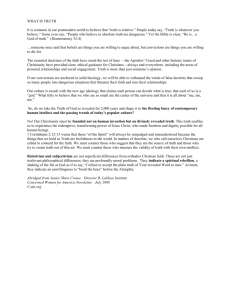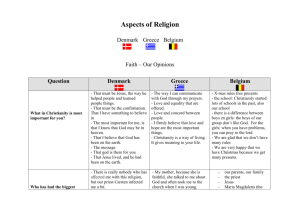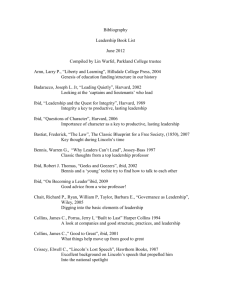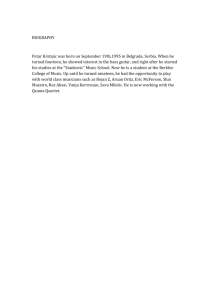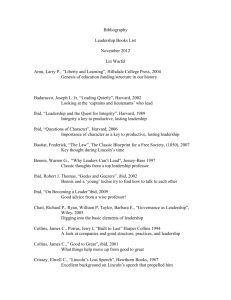“A New Reformation”
advertisement
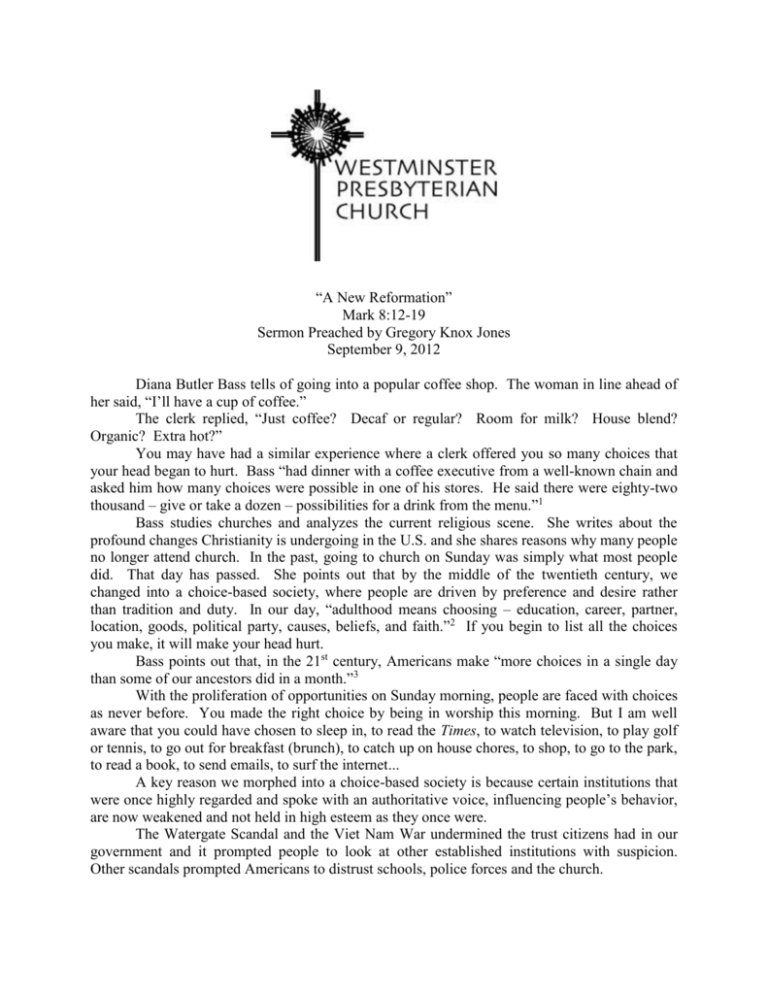
“A New Reformation” Mark 8:12-19 Sermon Preached by Gregory Knox Jones September 9, 2012 Diana Butler Bass tells of going into a popular coffee shop. The woman in line ahead of her said, “I’ll have a cup of coffee.” The clerk replied, “Just coffee? Decaf or regular? Room for milk? House blend? Organic? Extra hot?” You may have had a similar experience where a clerk offered you so many choices that your head began to hurt. Bass “had dinner with a coffee executive from a well-known chain and asked him how many choices were possible in one of his stores. He said there were eighty-two thousand – give or take a dozen – possibilities for a drink from the menu.”1 Bass studies churches and analyzes the current religious scene. She writes about the profound changes Christianity is undergoing in the U.S. and she shares reasons why many people no longer attend church. In the past, going to church on Sunday was simply what most people did. That day has passed. She points out that by the middle of the twentieth century, we changed into a choice-based society, where people are driven by preference and desire rather than tradition and duty. In our day, “adulthood means choosing – education, career, partner, location, goods, political party, causes, beliefs, and faith.”2 If you begin to list all the choices you make, it will make your head hurt. Bass points out that, in the 21st century, Americans make “more choices in a single day than some of our ancestors did in a month.”3 With the proliferation of opportunities on Sunday morning, people are faced with choices as never before. You made the right choice by being in worship this morning. But I am well aware that you could have chosen to sleep in, to read the Times, to watch television, to play golf or tennis, to go out for breakfast (brunch), to catch up on house chores, to shop, to go to the park, to read a book, to send emails, to surf the internet... A key reason we morphed into a choice-based society is because certain institutions that were once highly regarded and spoke with an authoritative voice, influencing people’s behavior, are now weakened and not held in high esteem as they once were. The Watergate Scandal and the Viet Nam War undermined the trust citizens had in our government and it prompted people to look at other established institutions with suspicion. Other scandals prompted Americans to distrust schools, police forces and the church. We discovered that some schools had passed along students and graduated them even though they were incapable of reading. Overreactions by police to Civil Rights demonstrators, Viet Nam War protestors, and later, the Rodney King beating, deteriorated public confidence in law enforcement. And it’s difficult to know where to begin with scandals involving the church. Some preachers ran off with money, others ran off with women. Some abused children and their superiors covered it up. Then, we have what Bass calls “The Horrible Decade.” She points out that the first few years of the 21st century were a disaster for religion. Immediately following the terrorist attacks on September 11, 2001, TV evangelist Pat Robertson, said that the attacks were God’s punishment on our nation. Robertson concluded that God was punishing us because too many Americans support women’s rights, gay rights and the ACLU. Many shook their heads in disbelief at his conclusions. Others said, “If that’s what Christianity is about, I want no part of it.” Soon, the media and politicians began to blame religion for the attacks. They started referring to the terrorists as “religious fanatics, fundamentalist zealots, medieval crusaders and holy warriors.”4 Someone posted a sign near ground zero that read: “God, save us from people who believe in you.” Journalist Christopher Hitchens wrote: “People of faith are in their different ways planning your and my destruction, and the destruction of all the hard-won human attainments. Religion poisons everything.”5 Then, in 2002, the Roman Catholic sex abuse scandal broke. The Boston Globe ran a number of articles on five priests accused of abusing children. It exploded into an international story involving hundreds of priests and thousands of victims. Soon we learned that bishops had not only tried to cover up the abuses, but in many cases had actually protected these predators.6 In 2003, the conflict in Protestant churches over homosexuality was pushed into the public arena when the Episcopal Diocese of New Hampshire elected an openly gay priest to become its bishop.7 Theological discourse turned nasty and was anything but Christ-like. In our own denomination, every time our General Assembly met for more than a dozen years, this was a divisive issue. Many wondered why a large segment of the church seemed to be persecuting gays. In 2004, conservative evangelicals were credited with a number of political victories. However, religious opinion poll takers began to notice the widening gulf between the conservative evangelical mix of religion and politics, and the values of younger generations, “particularly with regard to views of women, same-sex relationships, the environment, and issues of global poverty.”8 Polls throughout the first decade of this century have shown an ongoing drop in the public’s trust in religious institutions. And when the economic recession hit in 2007, it did not drive people back to church. It weakened the financial foundation of most congregations and has caused an increasing number of churches and synagogues to close their doors. There are other reasons that people have drifted away from the church or never had any connection. For one, family calendars bulge with activities, including Sunday morning sports events, so many people do not make time for church. Second, when mom and dad both work, the weekends become the time to catch up on jobs around the house or the opportunity to spend time with the family. Third, we have become an entertainment society. Many unconsciously turn to entertainment to distract them from reflecting on profound questions. Fourth, we are an affluent society. We use our wealth to do new and exciting things which help to distract us from the search for a more meaningful life and the internal peace that comes with a life in sync with God. Yet, while many have turned away from organized religion, many others have moved to other forms of spirituality. Numerous surveys point to a profound change occurring in American’s views of Christianity. Diana Butler Bass is one of a growing chorus – and I sing in that chorus – who thinks this might be the first stirrings of a new spiritual awakening. She believes Christianity is moving from being a religion about God to being an experience of God.9 For centuries, the church has focused on beliefs. To be a Christian has meant to believe certain doctrines about God and Jesus. But more and more voices are questioning this approach to faith. This morning’s passage of Jesus cursing the fig tree and overturning the tables in the temple reminds us that institutional religion can get off course. The minor items of faith can become the majors and the core elements of faith can be sidelined. In Jesus’ day, the Pharisees had turned faith in God into a rigid system of specific practices that separated people into two distinct groups: the righteous and the wicked. However, the strict rules delineating between good and bad suffocated the Spirit of God, producing people who were not righteous, but selfrighteous. Faith became a matter of pious talk and outward gestures and condemnation of those unlike themselves. The Temple religion of the Pharisees was not producing the fruit of God’s Spirit – love, joy, peace, patience, kindness, generosity. The fig tree was a symbol of the Temple religion, where pious prayers and animal sacrifices had become the main event, rather than seeking justice and caring for the poor. Jesus pointed out to his followers that there was no fruit on the tree, only leaves. His cursing of the fig tree was the symbolic rejection of what the Temple religion had become. His overturning of the tables and his declaration that the religious leaders had turned God’s house into a den of thieves was the moment of confrontation. How does this relate to the Christian Church in North America in the 21st Century? Many believe that the church has gotten off course. Faith has become a matter of right belief rather than right living; faith has become something outside of us that can be picked up on occasion and then set aside, rather than an internal force that drives our thoughts and actions. Many have come to believe that God created the world but now watches over it from a distance. God is not really involved with day to day happenings until I need God to solve my problem. But, perhaps we are in the midst of a new reformation when Christianity is changing. Perhaps we are moving from a time when Christianity focused on beliefs about God to an era when Christianity will become focused on an awareness and an experience of God. How can we live into this change? Here is a story to ponder that might provide a glimpse. Sharon Watkins tells of being with a group on a mission trip to Congo. They were deep in the forest, driving on nearly impassable roads in a pick up and a van. They rounded a bend and suddenly had to slam on the brakes. A large tree had fallen across the road, blocking their path. They all piled out of the vehicles and stood there, scratching their heads. Then there was a rustle among the trees and they noticed a group of children peeking at them with curious eyes. Next, women appeared, carrying parcels wrapped in brightly colored cloths. In a moment, some men emerged from the thick cluster of trees. They were carrying machetes and a door; a large wooden door. The men went straight to the tree blocking their path and began hacking away to open a passage. The others placed the door on the ground, and suddenly the door became a table. The women unwrapped their parcels revealing peanuts and bananas and Orange Fanta! Heaven knows where they got that Orange Fanta! They spread their feast and invited the Americans to join them in a meal. The Americans were strangers stranded deep in the jungle, and the people of that place came out to help them in their need. They spread a table, and in that act of hospitality God’s Spirit of love and joy and generosity was palpable. It was a glimpse of the divine paradise.10 How can we better recognize the presence of God in our midst? How can we live a life in harmony with Christ? How can the fruit of God’s Spirit become an integral and vibrant part of who we are? These are the matters you and I will be exploring through this sermon series this fall. NOTES 1. Diana Butler Bass, Christianity After Religion, (New York: HarperOne, 2012), p.41. 2. Ibid. 3. Ibid. 4. Ibid., p.77. 5. Ibid., p.78. 6. Ibid. 7. Ibid., p.79. 8. Ibid., p.80. 9. Ibid., p.110. 10. Sharon Watkins, “Where Earth and Heaven Meet,” on Day1.org for January 15, 2012.
